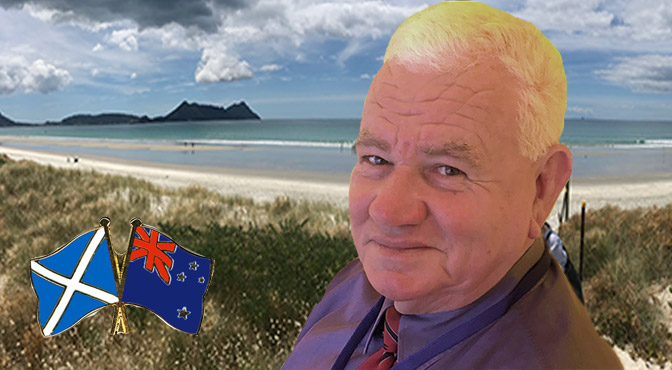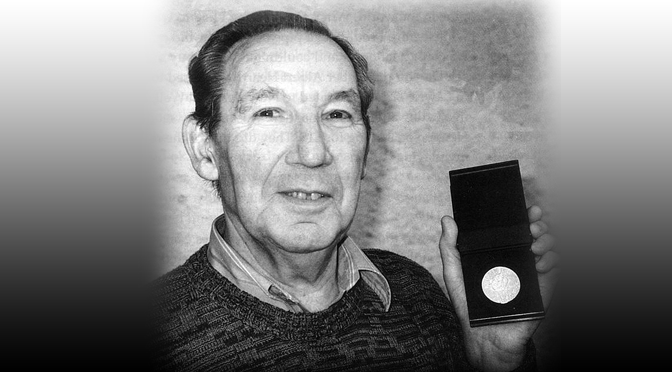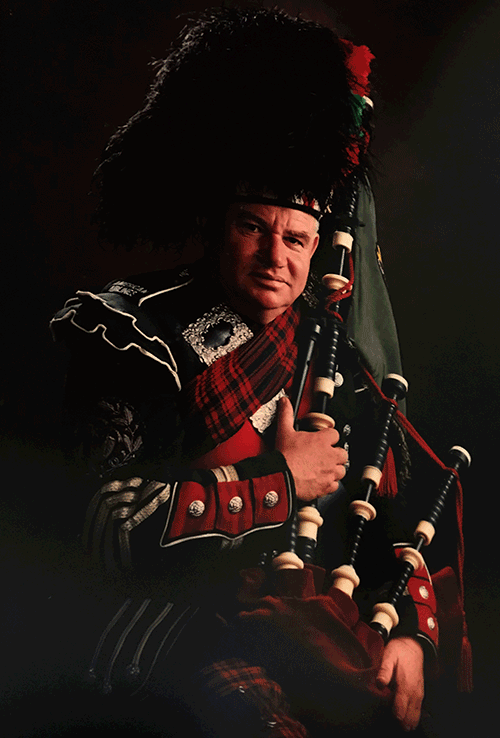
Stuart Finlayson is the renowned piper, composer and adjudicator from New Zealand. A prizewinner at the highest level, Stuart is well known to all generations via his outstanding compositions – tunes such as Stuart Chisholm’s Walkabout and the Motley Crew. As a teenager he left his homeland and took the long boat trip to Scotland where he studied piping with P/M Donald MacLeod and Duncan Johnstone. In this second part of this interview with editor Robert Wallace, Stuart talks of his time with these two giants of piping. Stuart is pictured above against the background of the beach near his home at Ruakaka on the North Island…….
You mentioned Duncan Johnstone. How did that association come about?
I went to Scotland with Stuart Chisholm and he’d heard that Duncan had given lessons to a couple of Australians already and wanted to go himself. So when we got to Glasgow he arranged that and I tagged along. Stuart was a painter by trade and he had a job already in the city. I didn’t and when Duncan heard this he said I should come and see him about it. Duncan was the boss of the joinery department at Scottish Lion, a ship repairing company. He gave me a job as a joiner’s labourer and I got to know him very well from then on. He looked after me pretty well for the three years that I worked in that job.
Did you get lessons from Duncan?
Yes but light music only. I didn’t get any light music from Donald [MacLeod}, it was all piobaireachd from him. All my light music I got from Duncan. The lessons were brilliant. They weren’t structured. You just got your pipes out and had a tune and he’d say whether it was good or not so good, you didn’t play that quite right, try it this way, that sort of thing. He didn’t play much but from what I did hear from him in person, and on radio broadcasts, I just fell in love with his style. So for the three years I was in Scotland I went to him non-stop.

Competition success?
I went to Scotland as a B grade piper and it took 18 months of an apprenticeship with Donald and Duncan before I really got going. I was starting to get some success at the end of my time there. Another year and I feel I could have made an impact. I played my jig Stuart Chisholm’s Walkabout at the Northern Meeting at Inverness. Donald had heard me and he said ‘I thought you’d won that Stuart’, so I must have been playing pretty well. At that same competition Seumas MacNeill was judging and he wrote in the Piping Times that the best strathspey of the day, I played Delvinside, was by Stuart Finlayson – however the worst reel was also played by Stuart Finlayson! Back in Glasgiow Duncan said to me ‘what did you do wrong?’ I told him that I just played it as we normally did.
[wds id=”6″]
Was it from Donald and Duncan that you got the idea to start composing?
I composed Stuart Chisholm’s Walkabout and had played it to Donald and he’d said ‘oh, I’ll have that!’ [for his next book]. That was the first tune I’d ever composed so I thought his response was encouraging. The tune actually ended up in John MacFadyen’s book and as they were partners in Grainger & Campbell I can only assume Donald told John about it. But it might have been via Duncan because he and John were great mates.
You went on to compose some other first class tunes as well.
Yes, I have had some success. The melody usually just comes to me; maybe only a couple of bars or just one bar. If you think it is quite nice you build on it and it might turn into something worthwhile. I never sit down to compose, to purposefully write a tune. An idea might be from some other music altogether, music from another instrument. You might hear a little phrase and you think ‘that’ll go well on the pipe’.[polldaddy poll=9642153]
Do you have one story that would illustrate your time with Donald and Duncan?
Not so much with Donald. He was aloof from us and I don’t mean that in a high-minded way. He was anything but. But the lessons were formal, strict, businesslike. I remember one New Year with Duncan at his house out at Priesthill [on the south-west of Glasgow] when we were playing outside in the snow. Duncan’s wife Isa wouldn’t let us have a drink until the bells at midnight. Once they struck, out would come the drams and you can imagine the rest.

Did Duncan ever talk about competing?
I think he gave it up when he was 27, just wasn’t interested. But he loved piping and pipers. Often after work I’d finish up back at Duncan’s and we’d have a dram and a pie for our dinner then some tunes and I’d end up sleeping on his couch. Then it was up at 6am for a dram and a cup of tea and the bus into work.
To do what you did shows a tremendous dedication but how do you think if formed you as an individual, your outlook on music and piping? You must have arrived back in New Zealand a much different player than the one who left.
Piping has been my life. I’ve structured jobs around it. I remember before I ever went to Scotland I had the opportunity to work with my hands and I decided no that won’t be good for the fingers, rightly or wrongly. When I arrived back here I was a changed man and of course a better player. The first competitions were the Hastings Highland Games where they have the Gold Medal and the Clasp and I won the Gold Medal there and also the light music, and for a good number of the years I was competing here I was winning a lot of the time. But then I took over the Innes Tartan band and things got too busy in the pipe band world and the solos dropped away. I just didn’t have time to devote to it.
My time with Donald and Duncan is something I will never forget. It was a unique period of my life. To have lessons from the two of them simultaneously – well there won’t be many who can boast of that. It was a dream and they were a dream ticket.
• Read the first excerpt of this interview here. The Duncan Johnstone Memorial competition will be held at the Piping Centre on March 10.
[wds id=”39″]



















Recent Comments